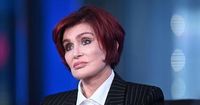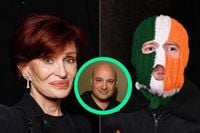In a controversial display of political expression at the Coachella music festival, the Irish hip-hop trio Kneecap has drawn significant backlash for their pro-Palestinian statements, leading to a call from music industry veteran Sharon Osbourne for the group's U.S. work visas to be revoked. The band, consisting of members Mo Chara, Móglaí Bap, and DJ Próvaí, utilized their platform at the festival to project messages condemning Israel's actions in Gaza, prompting a heated response from various quarters.
Kneecap's performance on April 18, 2025, included a powerful ending message that read, "Israel is committing genocide against the Palestinian people. It is being enabled by the U.S. government who arm and fund Israel despite their war crimes. Fk Israel; free Palestine." This bold declaration, displayed on a large screen behind the group, was part of a larger narrative they had been promoting throughout the festival, which also included chants against former British Prime Minister Margaret Thatcher during their first weekend.
Sharon Osbourne, known for her role as a music manager and television personality, took to social media to express her dismay over Kneecap's actions. In her Instagram post, she stated, "Coachella 2025 will be remembered as a festival that compromised its moral and spiritual integrity." She criticized the festival organizers, Goldenvoice, for allowing such political messages to permeate a musical event, arguing that music should serve as a unifying force rather than a platform for political discourse.
Osbourne's comments highlighted her concern regarding the appropriateness of Kneecap's participation in the festival, asserting that their performance crossed a line into hate speech. "Kneecap, an Irish rap group, took their performance to a different level by incorporating aggressive political statements. Their actions included projections of anti-Israel messages and hate speech, and this band openly supports terrorist organizations," she remarked.
In a pointed critique, she noted that reports indicated Goldenvoice was initially unaware of Kneecap's political intentions when they were booked. However, after witnessing their controversial performance during the first weekend, allowing them to perform again suggested a tacit endorsement of their rhetoric and a lack of due diligence on the part of festival organizers.
Osbourne's call for action extended to the Independent Artists Group, which represents Kneecap and includes individuals of Jewish heritage. She expressed disappointment that they did not intervene to prevent the promotion of what she described as controversial messages. "It is disheartening that they have not used their positions to prevent the promotion of such controversial messages," Osbourne stated.
In response to the backlash, David Draiman, the lead vocalist of the band Disturbed and a known advocate for Israel, publicly supported Osbourne's stance by sharing her post on social media. He is one of many in the music industry who have voiced their concerns regarding the political statements made during performances, particularly in light of the ongoing conflict in Gaza.
Following Kneecap's performance, several Jewish organizations also condemned the festival for allowing the group to express its views. The Creative Community for Peace (CCFP) issued a statement urging Goldenvoice and AEG to reconsider their relationship with Kneecap, citing the band's support for groups such as Hamas and Hezbollah. CCFP's executive director, Ari Ingel, criticized the festival for transforming a celebration of music into a platform for hate, especially during a time marked by rising antisemitism.
Ingel remarked, "Festivals such as Coachella are meant to bring people together to celebrate music and life; instead, they allowed the festival to devolve into a forum of hate — platforming a band that praised a terrorist group that carried out the largest massacre in music history." The Nova Community, which was affected by the tragic events at the Nova Music Festival in Israel last October, also expressed its hurt over Kneecap's statements, emphasizing the need for empathy and understanding rather than division.
Amid the uproar, Kneecap defended their actions, claiming that their pro-Palestinian messages were censored during their first weekend performance. They expressed frustration that their intended messages about the humanitarian crisis in Gaza were not displayed as planned, stating, "But our messaging on the U.S. backed genocide in Gaza somehow never appeared on screens." They further reacted to the criticism by asserting, "Honesty isn’t aggressive — f*ing bombs are," highlighting their perspective on the ongoing conflict.
Interestingly, Kneecap was not alone in their political expression at Coachella. Other artists, including headliners Green Day, also made statements regarding the situation in Gaza. Green Day's lead singer, Billie Joe Armstrong, altered the lyrics of their song "Jesus of Suburbia" to reference the plight of Palestinian children, further illustrating the festival's atmosphere of political engagement.
As the fallout from Kneecap's performance continues, Osbourne's calls for the revocation of their work visas have sparked a wider conversation about the role of music festivals in political discourse. Many are questioning whether platforms like Coachella should be spaces for political statements or if they should focus solely on celebrating music and unity.
In the wake of this controversy, the music industry finds itself at a crossroads, grappling with the intersection of art and activism. As artists continue to use their platforms to address pressing global issues, the question remains: how far should political expression go in spaces traditionally reserved for entertainment?
As the debate rages on, the implications of Kneecap's performance at Coachella will likely resonate beyond the festival grounds, influencing how artists and audiences engage with political issues in the future.







